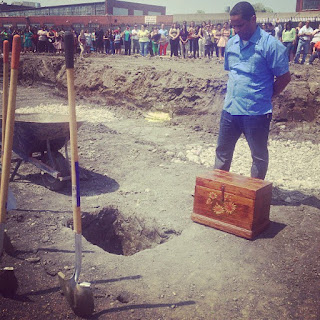The Supreme Court didn't attempt to define marriage today . . . but that day is coming.
For the record, here's how the Son of God defines marriage:
In Matthew 19:4-6, Jesus responds to a question about divorce:
He (Jesus) answered, "Haven't you read in your Bible
that the Creator originally made man and woman for each other, male and
female? And because of this, a man
leaves father and mother and is firmly bonded to his wife, becoming one flesh -
no longer two bodies but one. Because
God created this organic union of the two sexes, no one should desecrate his
art by cutting them apart."
If people don't believe in the Bible, then I totally
understand why they don't understand where Evangelical Christians stand on this
issue. I don't expect them to agree with me.
But think about this, once we leave our Christian heritage for good, who
gets to define right and wrong? If you
don’t use the Bible as your measuring stick, what do you use?
My life is built on the Bible, the word of God. That is my standard of truth. The Bible is my worldview. Everything I believe must pass through the
lens of my Biblical worldview. Period.
In 2013, Americans enjoy freedom of speech and
religion. That doesn’t mean my words and
my beliefs are popular. In fact, they’re
quickly becoming the opposite. No matter how unpopular my Biblical beliefs
become, I will continue to stand for the Biblical definition of marriage. There may come a day when pastors are
penalized and even put in jail for not agreeing to marry gay couples. That will not stop our family from preaching the
truths found in the word of God.
Why are so many churches embracing the homosexual lifestyle,
even allowing homosexual pastors in their pulpits? I think it depends on that church's or that
denomination’s interpretation of the Bible.
Some people take the whole Bible as literal truth, some people take it
metaphorically, some take what they like and throw out the rest, (just look up
“Biblical hermeneutics” to see all the ways to interpret scripture!) etc. I’ve always been a cover-to-cover girl. I believe the Old & New Testament. If something is a sin in the Old Testament
& it’s still called sin in the New Testament, then it’s wrong. Not just wrong for a specific time in history,
but wrong for all time.
Do I hate people who are living a gay lifestyle?
Heavens no! Are they welcome in my church? You better believe it! If we didn't allow people with issues into our church, no one would be there! We've all got issues! Homosexuality is just
one of the sins in the Bible, just as gossip, lying, stirring up dissension,
taking bribes, violence, adultery, stealing, drinking too much, etc. is
wrong. Do I hate people who gossip? Or people who lie? No! But, hypothetically speaking, I’m not going
to suddenly say it’s ok to gossip and to lie just because it’s the politically
correct thing to do . . .
Do I sympathize with people who are attracted to the same
sex? Absolutely. As believers, each one of us is a sinner
saved by grace. Even after salvation, we
struggle with temptations of the flesh.
This is why we so desperately need a Savior. He boldly asks us to “Take up our cross and
follow Him.” It won’t always be easy,
and there will be a cost to following Jesus.
This is why we need to be born again.
We willingly die to the flesh. We ask the Spirit to take over—and over
time, as we walk with Him, He sanctifies us and makes us more like Christ.
I could add a bunch of links to Bible verses that support my
beliefs. But if you really want to know
the truth, you will Google them for yourself and read them in context with the chapter before & after (it's dangerous to take a scripture out of context). If you want to continue to agree
with popular thinking, you won’t take the time.
I didn't write this blog to change your mind, which is probably already made up on this issue.
I guess I just wanted to draw a line in the sand today and
say, I stand on the side of marriage
between a man and a woman.


.jpg)


